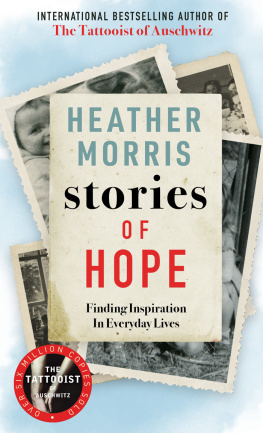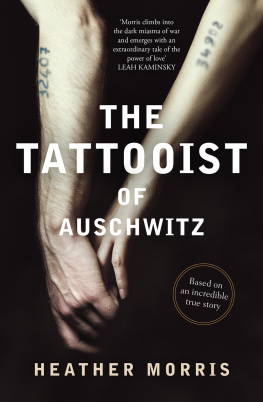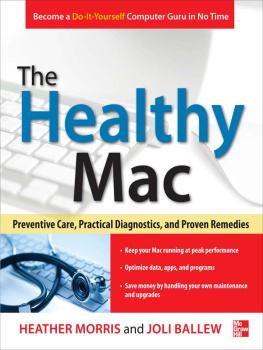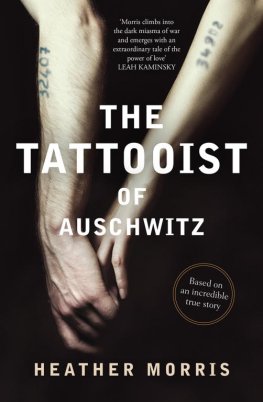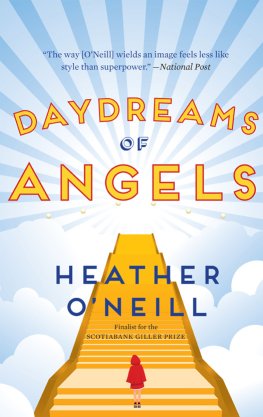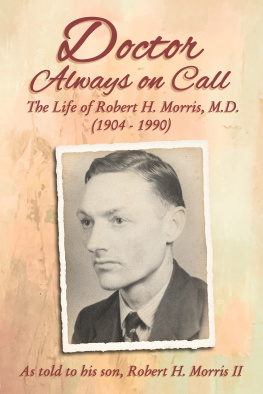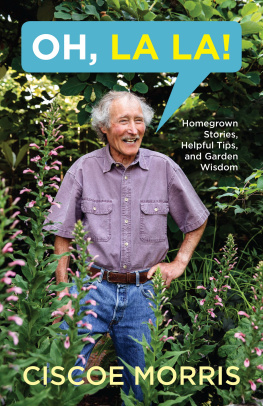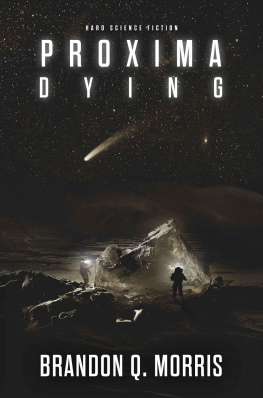Heather Morris - Stories of Hope
Here you can read online Heather Morris - Stories of Hope full text of the book (entire story) in english for free. Download pdf and epub, get meaning, cover and reviews about this ebook. publisher: Bonnier Publishing Fiction, genre: Home and family. Description of the work, (preface) as well as reviews are available. Best literature library LitArk.com created for fans of good reading and offers a wide selection of genres:
Romance novel
Science fiction
Adventure
Detective
Science
History
Home and family
Prose
Art
Politics
Computer
Non-fiction
Religion
Business
Children
Humor
Choose a favorite category and find really read worthwhile books. Enjoy immersion in the world of imagination, feel the emotions of the characters or learn something new for yourself, make an fascinating discovery.
- Book:Stories of Hope
- Author:
- Publisher:Bonnier Publishing Fiction
- Genre:
- Rating:4 / 5
- Favourites:Add to favourites
- Your mark:
- 80
- 1
- 2
- 3
- 4
- 5
Stories of Hope: summary, description and annotation
We offer to read an annotation, description, summary or preface (depends on what the author of the book "Stories of Hope" wrote himself). If you haven't found the necessary information about the book — write in the comments, we will try to find it.
Stories of Hope — read online for free the complete book (whole text) full work
Below is the text of the book, divided by pages. System saving the place of the last page read, allows you to conveniently read the book "Stories of Hope" online for free, without having to search again every time where you left off. Put a bookmark, and you can go to the page where you finished reading at any time.
Font size:
Interval:
Bookmark:


To Christopher Charles Berry, my great-grandfather, the person who first showed me how to listen.
To the First Responders around the world who are bravely fighting to keep us safe, giving us the hope we need during this pandemic for a brighter, better future.
To the staff, patients, and their families I was honoured to work with and engage with during my time at Monash Medical Centre in Melbourne. You showed me how to care.
Contents

1st January, 2020. A new day dawns, a new year, a new decade. A sense of hope for us, individually and collectively as a global community, that it will be a good year. In the words of Lale Sokolov, my dear friend and the man whose extraordinary story I told in The Tattooist of Auschwitz: If you wake up in the morning, it is a good day. Resolutions, both new and repeated from previous years, are made, perhaps whispered to our nearest and dearest. If we share our hopes and dreams for the year, they stand a better chance of happening, we are told.
The fireworks from the previous night, whether watched live or on a television set, have burnt out, the parties have packed up, hangovers are being nursed in a variety of ways. I live in Melbourne, on the east coast of Australia. This year, our celebrations were tempered, our fireworks did not go off in many places. We still made our wishes, hopes and dreams known, but these too were tempered. All of us were concerned about the bushfires that had started a week or so earlier and which were still far from being under control. In fact, they got worse. Much worse.
Over the next week towns were razed, people lost their lives, their homes, their communities. The impact on flora and fauna was devastating. Images went around the world of Australias two most iconic symbols kangaroos and koalas becoming the symbols of destruction and despair. New Zealand, Canada and the United States sent firefighters to help in what was fast becoming a national disaster. Three did not return home to their families they were killed when their plane went down during a water-bombing mission.
Celebrities around the world made considerable donations to help those affected. Small children gave up their summer holidays to sell cookies in the street, anything to help raise funds. The Royal Family sent their thoughts and prayers. Artists from around the world came to Australia, putting on the biggest live entertainment concert ever seen here. Millions and millions of dollars were handed over to the firefighters and to the charities set up to help those impacted.
For several weeks it seemed nothing could stop this monstrous blaze as smaller ones joined, charging from the mountains to the sea. Prepare for the worst, hope for the best. In this case, the best was rainfall of biblical proportions. We all prayed for rain. And eventually, that is what happened. The heavens opened and for days it rained, helping to extinguish many of the fires. The deluge on parched soil also wrought havoc, causing mudslides in areas weakened by the loss of ground-stabilising trees. Floods now ravaged small towns, killing the domestic livestock, destroying more homes.
The events in Australia in January 2020 resonated around the world, not because they dont happen anywhere else, but because Australias southern hemisphere summer made it the only country burning as the new decade began. The northern hemisphere was still recovering from its own summer of hell. But worse was to come. It was during this strange and unsettling time that we first heard the word Coronavirus, or Covid-19.
Since then, the world has changed beyond measure, beyond belief, beyond comprehension. We have all faced a pandemic of unknown proportions; the worst experienced by anyone alive today. It has brought stress levels to us individually and collectively like never before. Loss of jobs. Divorce. Illness that many may take a long time, if ever, to recover from. Death. With modern media, both conventional and social, few stories of tragedy go unreported. They are there, 24/7, for us to turn away from, then find ourselves turning back, such is our need to watch disasters unfold. We have pulled together, but sadly, we have also pulled apart. Curling up in the foetal position may be the only way some of us can blot out the pain of suffering emotionally, in our health, economically.
We have tried to take care of each other. After all, we are pack animals in a sense, drawn to human connection and contact. We have looked for joy in our changed living conditions. The smile of a young child oblivious to the pain of survival can be a huge tonic during an emotional low. The need to get out of bed and feed a pet has been for many of us what gets us through the day. Isolation can and has had a devastating effect on many of us. Where is my pack? Where is my tribe? Remember this: they are there, like you, waiting for the day when we can say, We got through this together. We are stronger. The wave of memes reminding us that our grandfathers fought a war for us while all we are being asked to do is sit on the sofa and watch Netflix makes a mockery of the real trauma of being forced to isolate for so many people. As Lale always said to me, All you have to do is wake up in the morning. Maybe we are now being asked to wake up in more ways than one.
Could this be our planet telling us to slow down? Has she not been screaming out to us for decades to take better care of her? How many warnings must she give us before we start listening to her? Many already have. In nearly every country there has been an ongoing battle, gathering force in the past couple of years, between governments and scientists over the impact of climate change. Amazing and inspiring activists, both young and old, are rallying the cause, telling those in power, telling all of us, that its time to shut up and listen to our planet.
Covid-19 is a common enemy that does not discriminate over religion, politics, gender orientation, race or age and its effects are being felt across the world. And yet in the face of this unknown, new enemy, the changes we are making are having unexpected and positive benefits. Within only a few weeks of this crisis, we received reports of cleaner air and a reduction in pollution levels across China and many European cities. As we were forced inside, the skies became clearer, the rivers ran cleaner. We could look outside at what awaited us.
As I write this, I look out my window onto my street. Today, I see not cars and vans but people. Men and women, all ages, alone, together, many with young children, even more accompanied by dogs. They walk the street, they talk; I can tell. They listen. Their dogs bark at other dogs hidden from view by fences, their presence still being made known. Keeping their social distance, they acknowledge each other. Many stop and chat briefly. What do these interactions tell me? For the first time in living memory, we have a common purpose. A common enemy which will be defeated by us all doing our bit.
At the height of the lockdown, I watched as a van pulled up outside a nearby house and a young girl took from the back a box, filled with groceries. I smiled at the Hollywood scene of a French stick of bread poking out the top. I watched as she knocked on the door, placed the box on the porch and stepped back. The elderly woman living in the house must have seen her coming as the door opened immediately. I heard her saying, Thank you, thank you, over and over. I heard the emotion in her voice. If I had needed to speak at that moment, I would have struggled. With a big smile and a You are very welcome, Ill see you in two days time, the girl danced back to the van.
Next pageFont size:
Interval:
Bookmark:
Similar books «Stories of Hope»
Look at similar books to Stories of Hope. We have selected literature similar in name and meaning in the hope of providing readers with more options to find new, interesting, not yet read works.
Discussion, reviews of the book Stories of Hope and just readers' own opinions. Leave your comments, write what you think about the work, its meaning or the main characters. Specify what exactly you liked and what you didn't like, and why you think so.

